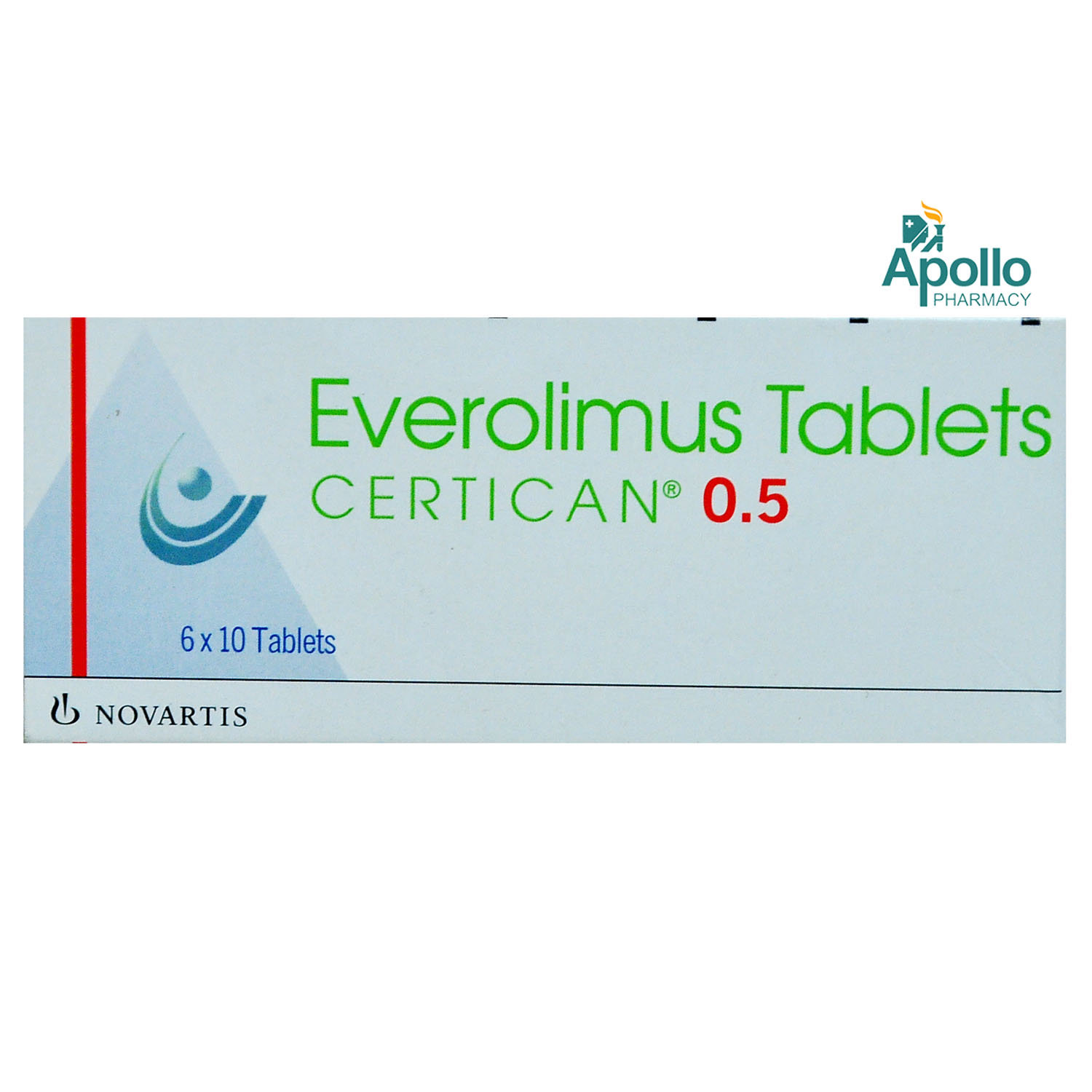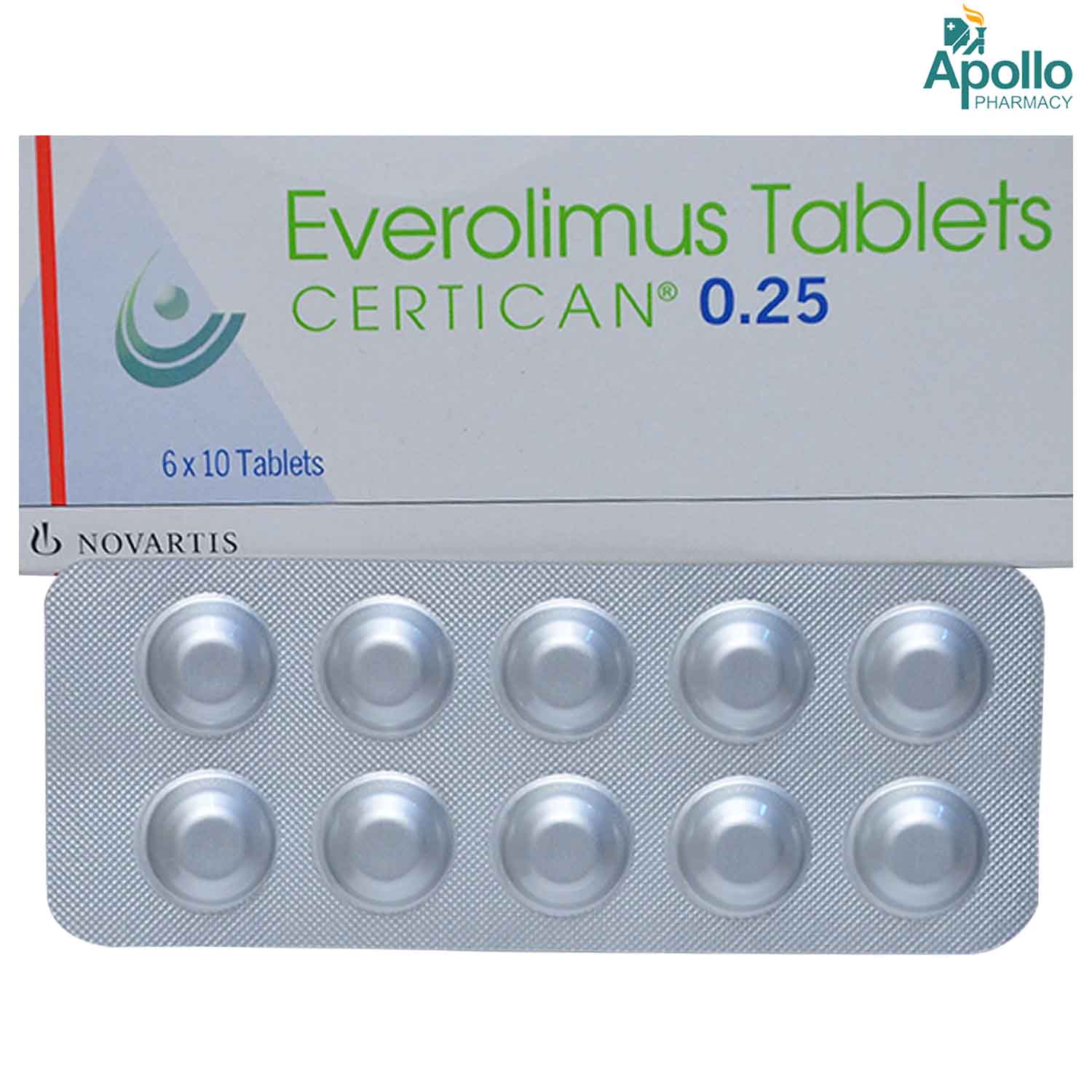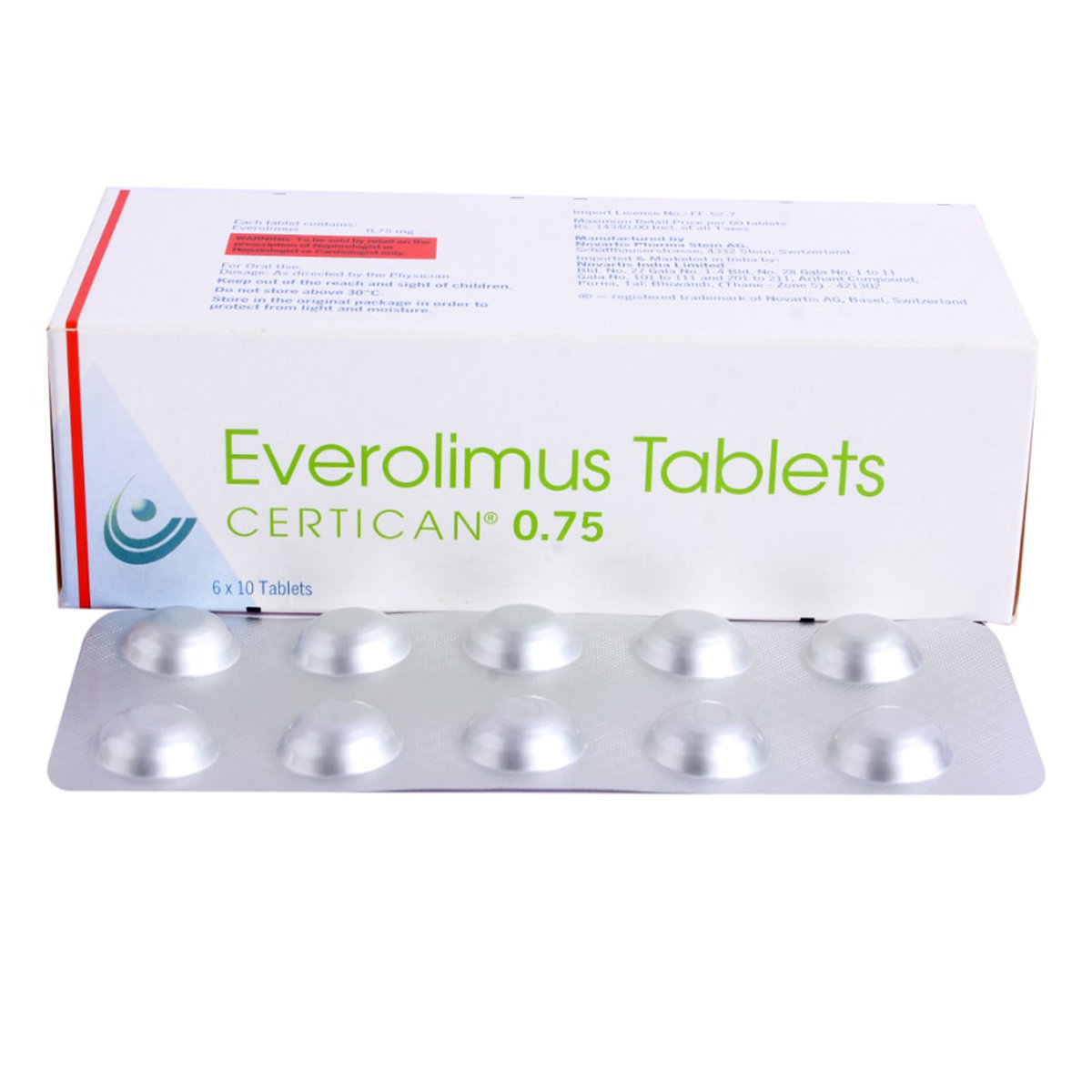Everolimus
About Everolimus
Everolimus belongs to the group of medicine called ‘anti-cancer’. It is primarily used to treat breast cancer, pancreatic cancer, lung cancer and kidney cancer. Breast cancer is a type of cancer that develops in breast cells stimulated by the female sex hormone known as estrogen. Pancreatic cancer is described as a cancerous growth in the pancreas which normally begins in the cells that generate the juices that help break down food and the hormones which help in controlling blood sugar levels. Lung cancer is the uncontrolled growth of abnormal cells in one or both lungs.
Everolimus contains 'Everolimus' which belongs to the group of medicines known as 'kinase inhibitors'. It works by decreases the activity of the immune system of the body and prevents rejection of the transplanted organ. It works by stopping the action of an abnormal protein that causes the multiplication of cancerous cells. In this way, it stops the spread of cancerous cells.
Take Everolimus as prescribed by your doctor. You are advised to take Everolimus for as long as your doctor has prescribed it for you depending on your medical conditions. You may experience weakness, infection, sinus inflammation, cough, diarrhea, fever, fatigue, otitis media (infection of the ear), stomatitis (Inflammation of the mouth) and upper respiratory tract infection. Most of these side effects of Everolimus do not require medical attention and gradually resolve over time. However, if the side effects persist or worsen, please consult your doctor.
To treat your condition effectually, continue taking Everolimus for as long as your doctor has prescribed. If you are known to be allergic to Everolimus or any other medicines, please tell your doctor. Do not take Everolimus if you are pregnant or planning for pregnancy as Everolimus may harm the unborn baby. Everolimus should not be taken by breastfeeding mothers as it may cause harm to the newborn baby. Everolimus causes tiredness, thus, it is advisable not to drive unless you are alert. Elderly people are more sensitive to medicine so they may adjust the dosage according to their condition.
Uses of Everolimus
Medicinal Benefits
Everolimus is indicated to the patients dealing with breast cancer, pancreatic cancer, lung cancer, kidney cancer and stomach/ intestinal cancer. Cancer of this type tends to spread quickly in other parts of the body. Everolimus travels through the bloodstream and effectively destroys cancerous cells and other parts of the body. It works by decreases the activity of the immune system of the body and prevents rejection of the transplanted organ. It works by stopping the action of an abnormal protein that causes the multiplication of cancerous cells. In this way, it stops the spread of cancerous cells. Besides this, it is also effective in people with genetic disorders to treat some types of tumors in the brain or kidney.
Directions for Use
Storage
Side Effects of Everolimus
- Tiredness
- Breathlessness
- Dizziness
- Headache
- Loss of appetite
- Infection
- Mouth ulcers
- Sinus inflammation
- Cough
- Diarrhea
- Fever
- High level of sugar in the blood (hyperglycemia)
- Signs of low level of red blood cells (anemia)
- Otitis media (infection of the ear)
- Stomatitis (Inflammation of the mouth)
- Upper respiratory tract infection.
- Swelling of arms, hands, feet, and ankles
Drug Warnings
If you are known to be allergic to Everolimus or any other medicines, please tell your doctor. Everolimus should not be taken in the conditions like liver disease, diabetes and high level of cholesterol. Do not take Everolimus if you have recent surgery, infection and hepatitis B. Everolimus may weaken your immune system, inform your doctor before taking Everolimus. Everolimus may also impair your kidney function. Therefore, monitor your kidney function regularly while taking Everolimus. Everolimus may cause cough, fever and shortness of breathing, thereby inform your doctor while taking your Everolimus. Everolimus may cause skin cancer, if you observe night sweating, weight loss, or change in color and size of the mole inform your doctor. Do not take Everolimus if you are pregnant or planning for pregnancy as Everolimus may harm the unborn baby. Everolimus should not be taken by breastfeeding mothers as it may cause harm to the newborn baby. Everolimus causes tiredness, thus, it is advisable not to drive unless you are alert. Elderly people are more sensitive to medicine so they may adjust the dosage according to their condition.
Drug Interactions
Drug-Drug Interaction: Everolimus may have interaction with antifungal medicines (ketoconazole, itraconazole, voriconazole, fluconazole), antibiotics (clarithromycin, telithromycin, erythromycin), anti-HIV medicines (ritonavir, efavirenz), blood pressure-lowering medicines (ramipril, verapamil, diltiazem), medicines for heart disease (dronedarone), medicines for decreasing growth of abnormal cells (imatinib), medicines for fits/ epilepsy (phenytoin, carbamazepine, phenobarbital).
Drug-Food Interaction: Avoid grapefruits and grapefruit juice.
Drug-Disease Interaction: Everolimus should not be given to the patients with liver disease, kidney disease, diabetes, high level of cholesterol and infections.
Drug-Drug Interactions Checker List:
Safety Advice

Alcohol
cautionYou are recommended to avoid alcohol consumption while taking Everolimus to avoid unpleasant side-effects.

Pregnancy
unsafeEverolimus is belonging to pregnancy C category. It is not safe in pregnancy as it may causes harm to the unborn baby. Do not conceive a baby while taking Everolimus.

Breast Feeding
unsafeEverolimus should not be taken by breastfeeding mothers as it may harm to the new-born baby.

Driving
cautionEverolimus may cause tiredness (fatigue), do not drive or operate heavy machinery if you feel dizzy.

Liver
cautionEverolimus should be taken with caution in patients dealing with liver disease. The doctor may adjust the dose according to the medical condition of the patient.

Kidney
cautionEverolimus is likely unsafe in patients with severe kidney disease as it may cause kidney failure which can be dangerous, use Everolimus only when prescribed by a doctor.

Children
unsafeEverolimus is not recommended for children below 18 years as the safety and effectiveness were not established.
Habit Forming
Diet & Lifestyle Advise
- Avoid smoking and alcohol consumption.
- Include leafy vegetables, citrus fruits, fatty fish, berries, yogurt, apples, peaches, cauliflower, cabbage, broccoli, beans, herbs and spices in your diet.
- Avoid fast food, fried food, processed meats, refined carbs and added sugar.
- Get optimal sleep, rest well.
- Performing yoga and other relaxation techniques may also improve physical and mental health and may reduce your stress levels.
- Maintain a healthy weight by performing regular low-strain exercises and eating healthy food.
Special Advise
- Everolimus should be taken under strict medical supervision. The doctor will regularly monitor your condition while taking Everolimus.
- Do not have immunizations/vaccinations without a doctor's advice.
- Avoid contact with people who have recently received live vaccines.
Patients Concern
Disease/Condition Glossary
Breast cancer: It is a type of cancer that develops in breast cells that are stimulated by a female sex hormone called estrogen. Breast cancer may form in lobules (glands that produce milk), ducts of the breast (the pathway that brings milk from glands to the nipple), in the fatty tissue or the fibrous connective tissue within the breast. The tumor cells invade other healthy breast cells and can travel to lymph nodes which are a primary pathway for the cancer cells to move to other parts of the body.
Lung cancer: It happens when cells in the lung begin to grow in an uncontrolled manner. The most common form of lung cancer is non-small cell lung cancer (NSCLC). It happens when cells that form the lining of the lung start growing uncontrollably. Persons who smoke are at high risk of lung cancer. A common symptom of lung cancer is a cough that does not go easily followed by shortness of breath. Cancerous cells of the lung spread off and travel through the bloodstream to distant regions of the body and grow.
Pancreatic cancer: It is described as a cancerous growth in the pancreas which normally begins in the cells that generate the juices. Juices are produced by the pancreas ( a gland present behind your stomach) help in the breakdown of food and hormones which help in controlling blood sugar levels.
Kidney cancer: Kidneys are the organs on either side of your backbone directly above your waist. The tubes present inside clean and filter your blood, taking out waste foods and making urine. Kidney cancer produces in the lining of tiny tubes inside your kidneys.
FAQs
Everolimus is an anticancer medicine. It belongs to a group of medicines known as a kinase inhibitor. It works by lowering the blood supply to the tumor, which reduces the growth and spread of cancer cells.
There is no specific duration of treatment with Everolimus. Everolimus is continued till benefit is seen or undesirable toxicity or side effects occur.
You should prevent grapefruit or grapefruit juice while taking Everolimus. This is because taking them together may rise the levels of Everolimus in your blood to toxic levels. Avoid the use of live vaccinations and any probable contact with people who have received live vaccinations.
Everolimus can lead to serious side effects that consist of severe allergic reactions, angioedema (painless swelling under the skin) and kidney failure which can be dangerous and can lead to death. It is possible that you may develop an infection or problems associated to lungs like breathing problems.
It usually takes three to six months for most types of lung cancer to double their size. It will take a long time for lung cancer to reach a size that could be diagnosed in X-Ray.








